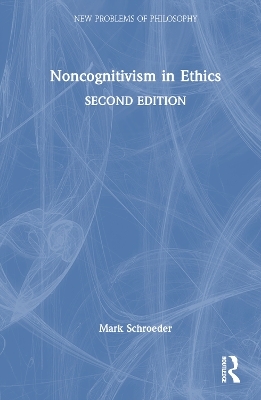
Noncognitivism in Ethics
Seiten
2023
|
2nd edition
Routledge (Verlag)
978-0-367-52927-7 (ISBN)
Routledge (Verlag)
978-0-367-52927-7 (ISBN)
This 2nd edition has been revised and updated throughout. Schroeder makes even the most difficult material accessible by offering crucial background along the way. Also included are exercises at the end of each chapter, chapter summaries, and a glossary of technical terms. Essential reading for all students of ethics and metaethics.
According to noncognitivists, when we say that stealing is wrong, what we are doing is more like venting our feelings about stealing or encouraging one another not to steal, than like stating facts about morality. These ideas challenge the core not only of much thinking about morality and metaethics, but also of much philosophical thought about language and meaning.
Noncognitivism in Ethics is an outstanding introduction to these theories, ranging from their early history through the latest contemporary developments. Beginning with a general introduction to metaethics, Mark Schroeder introduces and assesses three principal kinds of noncognitivist theory: the speech-act theories of Ayer, Stevenson, and Hare; the expressivist theories of Blackburn and Gibbard; and hybrid theories. He pays particular attention both to the philosophical problems about what moral facts could be about or how they could matter, which noncognitivism seeks to solve, and to the deep problems that it faces, including the task of explaining both the nature of moral thought and the complexity of moral attitudes, and the ‘Frege–Geach’ problem.
This second edition has been revised and updated throughout. It includes new sections on whether expressivism is a metasemantic thesis; the rise of relational expressivism; the idea that expressivism leads us to a novel understanding of the nature of propositions; and expressivism and epistemic modals, deontic modals, probability, and truth.
Schroeder makes even the most difficult material accessible by offering crucial background along the way. Also included are exercises at the end of each chapter, chapter summaries, and a glossary of technical terms, making Noncognitivism in Ethics essential reading for all students of ethics and metaethics.
According to noncognitivists, when we say that stealing is wrong, what we are doing is more like venting our feelings about stealing or encouraging one another not to steal, than like stating facts about morality. These ideas challenge the core not only of much thinking about morality and metaethics, but also of much philosophical thought about language and meaning.
Noncognitivism in Ethics is an outstanding introduction to these theories, ranging from their early history through the latest contemporary developments. Beginning with a general introduction to metaethics, Mark Schroeder introduces and assesses three principal kinds of noncognitivist theory: the speech-act theories of Ayer, Stevenson, and Hare; the expressivist theories of Blackburn and Gibbard; and hybrid theories. He pays particular attention both to the philosophical problems about what moral facts could be about or how they could matter, which noncognitivism seeks to solve, and to the deep problems that it faces, including the task of explaining both the nature of moral thought and the complexity of moral attitudes, and the ‘Frege–Geach’ problem.
This second edition has been revised and updated throughout. It includes new sections on whether expressivism is a metasemantic thesis; the rise of relational expressivism; the idea that expressivism leads us to a novel understanding of the nature of propositions; and expressivism and epistemic modals, deontic modals, probability, and truth.
Schroeder makes even the most difficult material accessible by offering crucial background along the way. Also included are exercises at the end of each chapter, chapter summaries, and a glossary of technical terms, making Noncognitivism in Ethics essential reading for all students of ethics and metaethics.
Mark Schroeder is professor of philosophy at the University of Southern California, USA. He is the author of Explanation and Expression in Ethics, Volumes 1 and 2 (2014 and 2015), Reasons First (2021), Slaves of the Passions (2007), and Being For: Evaluating the Semantic Program of Expressivism (2008).
Preface to the Second Edition Note for Instructors Acknowledgements 1. The Problems of Metaethics 2. The Noncognitivist Turn 3. The Frege–Geach Problem, 1939–1970 4. Expressivism 5. Moral Thought 6. The Frege–Geach Problem, 1973–1988 7. The Frege–Geach Problem, 1988–2008 8. Truth and Objectivity 9. Epistemology – Wishful Thinking 10. The Hybrid Gambit 11. Applications 12. Prospects. Glossary of Terms Structured Bibliography Index
| Erscheinungsdatum | 20.07.2023 |
|---|---|
| Reihe/Serie | New Problems of Philosophy |
| Zusatzinfo | 1 Line drawings, black and white; 1 Illustrations, black and white |
| Verlagsort | London |
| Sprache | englisch |
| Maße | 156 x 234 mm |
| Gewicht | 453 g |
| Themenwelt | Geisteswissenschaften ► Philosophie ► Ethik |
| Geisteswissenschaften ► Philosophie ► Sprachphilosophie | |
| ISBN-10 | 0-367-52927-0 / 0367529270 |
| ISBN-13 | 978-0-367-52927-7 / 9780367529277 |
| Zustand | Neuware |
| Informationen gemäß Produktsicherheitsverordnung (GPSR) | |
| Haben Sie eine Frage zum Produkt? |
Mehr entdecken
aus dem Bereich
aus dem Bereich


